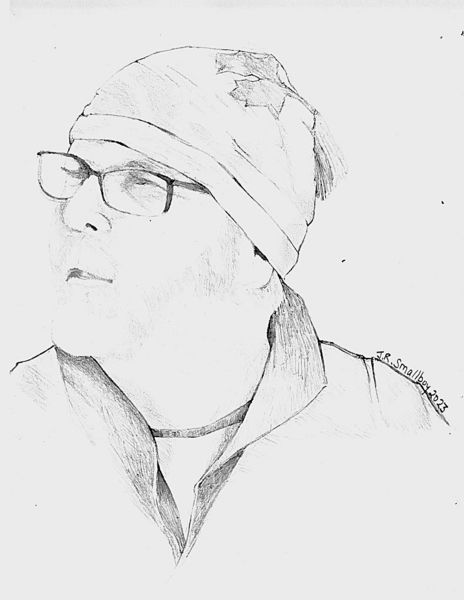Excerpt: Joe Pete, the Final Book from Ian McCulloch, a Staple of the Northern Writing Community
The star of Ian McCulloch's final novel, Joe Pete (Latitude 46 Publishing) is Alison, an eleven-year-old girl better known as the titular Joe Pete. Devastated by the death of her father Sandy, a descendant of Missinabi Cree people, Joe Pete teams up with her cousin Simon to search for her father, who fell through the ice. Determined to find him despite evidence of his death, Joe Pete's grit and faith take her in unexpected directions, revealing truths she could never have anticipated.
A story of love, kinship, identity, weather, and truth, Joe Pete is populated with unforgettable characters and explores the connections between the past and future, both in terms of blood and spirit. Published posthumously, Joe Pete is a crowning achievement in McCulloch's literary legacy, which includes poetry, fiction, and his work co-founding Northern Ontario’s longest-running reading series, The Conspiracy of Three.
We're sharing an excerpt from this final novel from McCulloch in celebration of his contributions and deep commitment to the vibrant literary community in Northern Ontario. In this section, we get a glimpse into Joe Pete's life with her mother and grandmother following Sandy's death – their warmth, their struggles, and their stories.
Excerpt from Joe Pete by Ian McCulloch:
Joe Pete was awakened by something she could not at first identify and she lay listening in the darkness trying to determine if it was real or part of a dream. It was the crepitating sound of footsteps punching through the brittle crust near their house and for a moment she thought of her father, heading out in the darkness with Pinky as he had done so often in the past. She was on the verge of hurling herself down the steep stairs that led up to her loft and out through the door to run barefoot down the icy path and beg him not to go when she realized this could not be true. Then she became aware of another familiar noise, her mother peeing into the metal bucket she used at night to avoid stumbling out to the cold outhouse.
“Mrs. McWatch. It’s time. Baby’s coming. It’s time now.”
She did not immediately recognize the voice. She imagined her mother squatting over the metal bucket and jerking her nightdress back down over her knees as she heard her hiss, “Get away from the window Mr. Turkula. I’ll come as soon as I’m dressed.”
“Okay. Sorry. Okie dokie. I don’t think you’d hear at door. Come quick. Annie say baby’s coming fast.”
“All right. Now get away from the window so I can get dressed.”
“Okay. Sorry. All right. I’ll go back. Sorry. You come quick.”
Joe Pete heard his footsteps hurrying away and then cursing loudly but unintelligibly. She looked out her small window to see that one foot had plunged down through the crust and his trouser leg was bunched up around his knee. He had pitched forward onto his elbows and was trying to right himself while keeping his bare left hand out of the snow. He held the base of a lantern which he was struggling to keep upright and there was a bit of sleet streaking down in the dome of light around him, glistening in the dark fringe of hair on his bald, hatless head. He found his footing and took a few tentative steps then stopped and kicked trying to shake the snow out of his pant leg. He looked back, holding the light high as if hoping to see the midwife running out the door in hot pursuit. Her mother muttered in the darkness below and struck a match. It was obvious from what she could make out that her mother didn’t quite share the man’s sense of urgency. She wrapped a blanket around her shoulders and went down the stairs.
Your CanLit News
Subscribe to Open Book’s newsletter to get local book events, literary content, writing tips, and more in your inbox
“Did that idiot wake you? My God, the woman’s had six children already. She’s as reliable as Sunday dinner.” The look of stern exasperation on her face melted into a chuckle. “Well, lately I guess Sunday dinner ain’t been so reliable around here, now has it?”
She felt the reproach she had been harbouring towards her mother dull, replaced by something more sympathetic and conspiratorial. Since the death of her father, her mother had not had much time for grief or rest and had worked hard to earn a living for them. She had taken over as the midwife for Lower Town since Miss Barnes, the spinster who everyone called Nurse Myrtle, had retired and moved to live with her brother in Sudbury two years before. It had been a way to make additional money after Joe Pete had started school full-time and she could only cook in the logging camps for the summer. Sometimes she would take in laundry as well, but fortunately there had been a run of births in the new year. Her fee was ten dollars and this included ten days after the birth of care and cleaning. Laundered sheets and diapers, housekeeping and the evening meal while the new mother got back on her feet. Joe Pete could only shrug. Her mother was dressing by the stove, stepping into the simple black widow’s dress she wore every day now, pulling it up over her nightgown. She pulled the material out at the hips and wiggled a bit to get everything settled.
“I’m going to run over and see that baby born. If I know Mrs. Turkula there’s lots of time yet. I’ll probably be there all night and Turk.” The girl smiled at this because she knew that he hated this moniker, had seen him go livid over its use, ‘I’m a Finn Godammit. A Finn.’ “I mean Mr. Turkula is probably more worried about who’s going to make him his lunch for work. But once everything’s settled down I’ll come home. I want you to go over to The House?”
She nodded her head. She’d spent many nights lately sitting with Poppa Sam. Alone together in his kitchen drinking tea she called him Okemah. His place they called The House and theirs was The Cabin. He had offered to trade with them when they had moved onto The Arm after the fire but Sandy had refused. I won’t put my father out of his own place, he’d said. It was supposed to be temporary but then the hard times had hit.
Poppa Sam would let her put in as much sugar in her tea as she wanted and cool it with condensed milk from a can. He always used his hunting knife to punch a couple of holes in the top making a show of standing the knife up near the rim and slapping the butt end with his other hand before giving it a slight twist. They would sip their tea and he would light his pipe while she sat quietly in anticipation. Then, after the proper interval of contemplation and expectation he would begin to tell stories, one leading to the next. Stories from his life in the bush and of the lives of their ancestors. Stories of people and relatives mixed in with legends of manitou’s and tricksters, and many times it couldn’t be distinguished when one merged into another. She wanted now especially to hear only those that involved her father. It nurtured the hope that he was still out there in the dark trees beyond the blank windows while she listened to these tales, and the room filled with the intoxicating scents of sweet tea and pipe smoke and the things her grandfather had made with his own hands. Things formed of rawhide, fur, sinew, and steamed wood. He coaxed so many useful shapes out of such materials. Stretching and drying. Carving and steaming. Using heat and patience to bend and mold a bit of timber or a length of gut into something else. An artefact that still held the phantom beauty of the tree. The grain and vigour of its being.
A board might creak in another room or there might be the sound of something shuffling past out in the darkness and it was easy for her to imagine the others were close by. The distant, the dead, and the mythic milling about them in the shadows. Perhaps dancing a pantomime of their own story the way her grandfather told her people used to dance when he was a boy in a place far away. Stories were history, they were life and they foretold what might be. She understood this but it was a fragile and tangential comprehension. Like the smoke rings her grandfather playfully blew into the flickering light of the candles. They could not be grasped or held. When you reached for them they disintegrated, melting into drifting, sinuous tendrils.
Sometimes the door might rattle struck by a violent gust or a spark would explode and ping vehemently around inside the stove. Okemah would pause to rub his stubbled chin or stroke his moustache before nodding and correcting himself over a point in his story before carrying on. A name or location or a subtle shift in chronology. It would make the hairs on the nape of her neck lift and sometimes she might shiver in that way that invariably prompted the old man to ask teasingly, “Somebody step on your grave?”
It was an aphorism that Joe Pete never understood and unnerved her in the way that it shifted Time; future affecting present, evoking her own death and relegating her to memory before she had really even lived. It caused her to wonder if her grandfather’s reminiscences were flying back into the past, like the bright explosive embers sometimes propelled out of the open stove door, to tingle along the spines of those long dead. It often frightened her, that immediacy waiting there in the shifting light of the simple kitchen, her grandfather’s face with its deep furrows and thick moustache floating in front of her. She knew he was part of the legacy of the people who had risen out of this place, the lakes and rivers and the forested landscape from where they were to Lake Superior, north to James Bay and beyond. She could feel its magic and immanence in her bones as she sat listening to the old man, who was lost himself in the telling. She could sense the great span of time that fed his knowledge, actually see it there in the sinew and stark knuckles and calloused contours of his hands. Her mother seemed to be reading her thoughts. “And no lip-flapping tonight. Straight to bed.”
Alison sighed. “I’ll be okay here,” she mumbled, rocking unsteadily on her heels a bit and pulling the blanket more tightly around her.
Louisa fed the biggest log she could find into the fire. “I hope that will last till I get back. You go up and gather your school clothes together and then skedaddle to your grandfather’s. I don’t want you missing any more school.”
Poppa Sam was standing out on his porch, a glowing lantern casting light under a sky that had surrendered all its stars, even as his drowsy granddaughter was given a little push towards The House. Louisa was not surprised to see the waiting beacon. Somehow her father-in- law seemed to always know what was going on in his little domain no matter the hour. He had been their guardian whenever Sandy was away and he had taken on the role with more resolve since the accident. She waved, despite knowing he could not see to where she stood in darkness, watching her sleepy daughter’s progress a moment. Then headed off with single-minded purpose along the path that led to town and the fruitful Mrs. Turkula.
Joe Pete stumbled across the short, familiar distance and into the weak circle of light clutching the bundle that held her school clothes against her chest.
“Wahchay, Noo sei sim,” he said when she started up his porch steps.
“Wachay, Okemah,” she answered.
It pleased him when she used this term of respect rather than calling him Poppa Sam. When she wanted to tease him, and thought she could get away with it, she conjured his official name, Saintus Mecowatch. Sometimes he regretted that he had given in to her insistent curiosity and revealed it after he’d let slip that Samuel was not really his name while she was helping him learn cursive writing to improve his signature. He wryly referred to the moniker as his Dominion of Canada name and he had shared it with very few people in his life. It had been assigned to him in a long-ago census by his father George Boyce, an Irish Catholic working for the Company at Missinaibi Lake House and briefly married to his mother in a country ceremony that amounted to little more than jumping over a broom together. It was a moot ritual at that point anyway since they had been living together some time and she was already too heavy with child to really jump. He had quit after the first year, just after his son’s birth, allegedly over a wage dispute and returned home. He had held little affection for the dark-skinned infant son of his Country Wife and had made up the name on the spot while drunk. There were suspicions that perhaps his mother had misheard or misunderstood what the inebriated man had actually said.
Okemah, of course, had no memory of his father but he must have held some special place in his mother’s heart because the unusual name stuck and she would not call him anything else, though she took the name Mecowatch from her second husband. Perhaps she felt that its Christian sound would be a kind of protection for her son or that the power of what was written down could not be resisted. However it had come, for the first few years of his life he had been known as Little Saintus. A name that inspired much teasing during his growing up. As a young man still in his teens, he had left Missinaibi and gone north to work at Moose Factory and there, starting fresh, adopted the more common name of Samuel.
____________________________________________________
Excerpt taken from Joe Pete by Ian McCulloch, published by Latitude 46 Publishing. Copyright estate of Ian McCulloch, 2023. Reprinted with permission.
Ian McCulloch (1957-2019) was born in Comox, B.C. and raised in Northern Ontario. A member of the Chapleau Cree First Nation (Fox Lake), his writing was deeply influenced by family and his indigenous heritage. He was the author of three books of poetry: The Moon of Hunger (Penumbra, 1982), The Efficiency of Killers (Penumbra, 1988) and Parables and Rain (Penumbra, 1993) and the chapbooks, A Balsam to Ease All Pains (Alburnum Press, 1998), Certain Humans and A Box of Light (both above/ground press, 2019). He was also the author of the novel Childforever (Mercury, 1996). A founding member of Northern Ontario’s longest-running reading series, The Conspiracy of Three.








